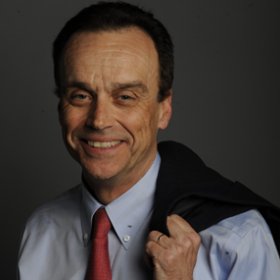
The American Giants
For Andrew Nagorski, who grew up abroad, the Giants were more than a baseball team -- they were a key to his American identity. Read more in The International Herald Tribune.
These days my fanatical allegiance to the San Francisco Giants usually evokes puzzled looks. After all, I was born in Scotland of Polish parents, who came to the United States when I was less than a year old, and I spent much of my life abroad — first, when my father worked as a naturalized-citizen-turned American diplomat, and later, when I embarked on a career as a foreign correspondent for Newsweek.
I’ve never lived in San Francisco, and since I returned to the United States a decade ago, New York has been my home. But the headline “The Giants Win the World Series” was my dream. And that dream finally came true on Monday night when the Giants beat the Texas Rangers in Game 5 of the series.
The explanation is both a typical baseball story and a broader American one. My family ended up in New York in the 1950s, and my father decided to take me to my first baseball game when I was about eight years old. Not that he had any interest in baseball or knew the rules of the game. But he wanted his children to grow up as fully integrated Americans, and he was told that this is what American fathers did: They took their sons to baseball games.
So he took me to the Polo Grounds. For New Yorkers of a certain age, that’s all the explanation that’s needed. For everyone else, there’s more to tell.
The Polo Grounds was the home to the New York Giants, the team that had swept the Cleveland Indians in the 1954 World Series — the last time they won. But my father took me to my first game when that phenomenal season was already a fading memory.
Willie Mays was still electrifying the fans, but I quickly became used to long losing streaks. In 1956 and 1957, the Giants languished in sixth place, and one of my most excruciating memories is of watching Ruben Gomez walk successive opposing batters around the bases, forcing in runs.
As any real baseball fan knows — except Yankees fans, of course — a losing team can inspire crazed devotion. They did in my case. And it didn’t matter that the Giants moved to San Francisco in 1958. By then, we had already moved to Washington and were soon on our way to places like Cairo, Seoul and Paris. So I had to monitor the Giants from afar, wherever they would be. And I did so religiously.
Looking back, I realize that this wasn’t just about baseball, no matter how much I loved the game. By taking me to the Polo Grounds, my father had forged a bond that would remain a key part of my American identity. I was listening on a transistor radio to the Armed Forces Network in South Korea when Willie McCovey drilled the line drive into the glove of Yankees’ second baseman Bobby Richardson that ended Game 7 of the 1962 World Series. The fact that I was halfway around the world did nothing to diminish my anguish — or my feeling that I was right there when it happened.
Living elsewhere abroad without American radio, I had to rely on the International Herald Tribune to give me two-day old scores. As a foreign correspondent, I got to read the wires, making me feel almost up-to-date, although they would make me wait until the completion of the very last game to send them out. Pre-Internet, I discovered a phone number in the United States that I could call to get scores faster.
After the Giants won Game 2 of the World Series last week, I called my father to tell him that he is to blame for my addiction. He is 98 and ailing, but his laugh conveyed real satisfaction. He never did learn the intricacies of the game, and he still thinks of the Giants as losers because most of the games we saw together ended badly. Still, he knows he did the right thing when he took me to the Polo Grounds. The Giants call San Francisco their home now, but I could just as easily call them the American Giants.
Click here to read this piece in the International Herald Tribune.
Andrew Nagorski is vice president and director of public policy at the EastWest Institute. A former Newsweek foreign correspondent and editor, he is the author of "The Greatest Battle: Stalin, Hitler, and the Desperate Struggle for Moscow That Changed the Course of World War II."

